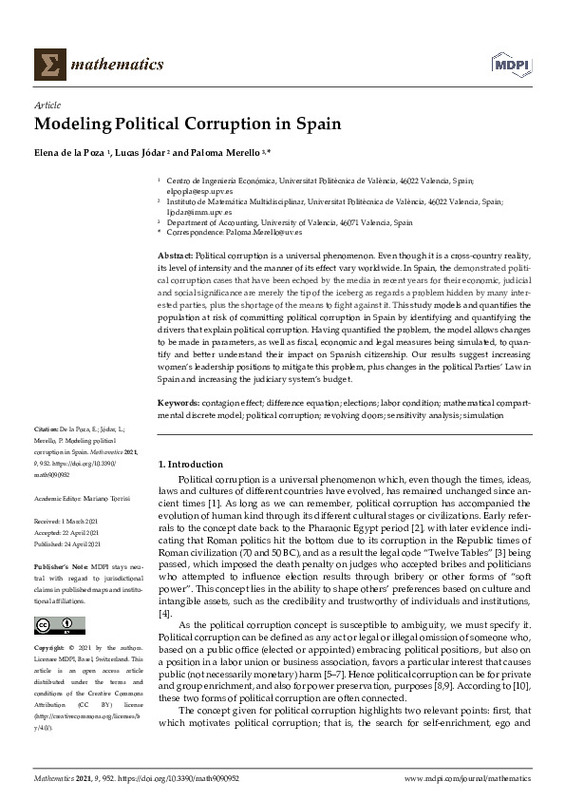JavaScript is disabled for your browser. Some features of this site may not work without it.
Buscar en RiuNet
Listar
Mi cuenta
Estadísticas
Ayuda RiuNet
Admin. UPV
Modeling Political Corruption in Spain
Mostrar el registro sencillo del ítem
Ficheros en el ítem
| dc.contributor.author | De la Poza, Elena
|
es_ES |
| dc.contributor.author | Jódar Sánchez, Lucas Antonio
|
es_ES |
| dc.contributor.author | Merello, Paloma
|
es_ES |
| dc.date.accessioned | 2022-09-22T18:03:22Z | |
| dc.date.available | 2022-09-22T18:03:22Z | |
| dc.date.issued | 2021-05 | es_ES |
| dc.identifier.uri | http://hdl.handle.net/10251/186470 | |
| dc.description.abstract | [EN] Political corruption is a universal phenomenon. Even though it is a cross-country reality, its level of intensity and the manner of its effect vary worldwide. In Spain, the demonstrated political corruption cases that have been echoed by the media in recent years for their economic, judicial and social significance are merely the tip of the iceberg as regards a problem hidden by many interested parties, plus the shortage of the means to fight against it. This study models and quantifies the population at risk of committing political corruption in Spain by identifying and quantifying the drivers that explain political corruption. Having quantified the problem, the model allows changes to be made in parameters, as well as fiscal, economic and legal measures being simulated, to quantify and better understand their impact on Spanish citizenship. Our results suggest increasing women's leadership positions to mitigate this problem, plus changes in the political Parties' Law in Spain and increasing the judiciary system's budget. | |
| dc.language | Inglés | es_ES |
| dc.publisher | MDPI AG | es_ES |
| dc.relation.ispartof | Mathematics | es_ES |
| dc.rights | Reconocimiento (by) | es_ES |
| dc.subject | Contagion effect | es_ES |
| dc.subject | Difference equation | es_ES |
| dc.subject | Elections | es_ES |
| dc.subject | Labor condition | es_ES |
| dc.subject | Mathematical compartmental discrete model | es_ES |
| dc.subject | Political corruption | es_ES |
| dc.subject | Revolving doors | es_ES |
| dc.subject | Sensitivity analysis | es_ES |
| dc.subject | Simulation | es_ES |
| dc.subject.classification | MATEMATICA APLICADA | es_ES |
| dc.subject.classification | ECONOMIA FINANCIERA Y CONTABILIDAD | es_ES |
| dc.title | Modeling Political Corruption in Spain | es_ES |
| dc.type | Artículo | es_ES |
| dc.identifier.doi | 10.3390/math9090952 | es_ES |
| dc.rights.accessRights | Abierto | es_ES |
| dc.contributor.affiliation | Universitat Politècnica de València. Departamento de Economía y Ciencias Sociales - Departament d'Economia i Ciències Socials | es_ES |
| dc.contributor.affiliation | Universitat Politècnica de València. Departamento de Matemática Aplicada - Departament de Matemàtica Aplicada | es_ES |
| dc.contributor.affiliation | Universitat Politècnica de València. Instituto Universitario de Matemática Multidisciplinar - Institut Universitari de Matemàtica Multidisciplinària | es_ES |
| dc.description.bibliographicCitation | De La Poza, E.; Jódar Sánchez, LA.; Merello, P. (2021). Modeling Political Corruption in Spain. Mathematics. 9(9):1-19. https://doi.org/10.3390/math9090952 | es_ES |
| dc.description.accrualMethod | S | es_ES |
| dc.relation.publisherversion | https://doi.org/10.3390/math9090952 | es_ES |
| dc.description.upvformatpinicio | 1 | es_ES |
| dc.description.upvformatpfin | 19 | es_ES |
| dc.type.version | info:eu-repo/semantics/publishedVersion | es_ES |
| dc.description.volume | 9 | es_ES |
| dc.description.issue | 9 | es_ES |
| dc.identifier.eissn | 2227-7390 | es_ES |
| dc.relation.pasarela | S\435950 | es_ES |
| dc.subject.ods | 16.- Promover sociedades pacíficas e inclusivas para el desarrollo sostenible, facilitar acceso a la justicia para todos y crear instituciones eficaces, responsables e inclusivas a todos los niveles | es_ES |








